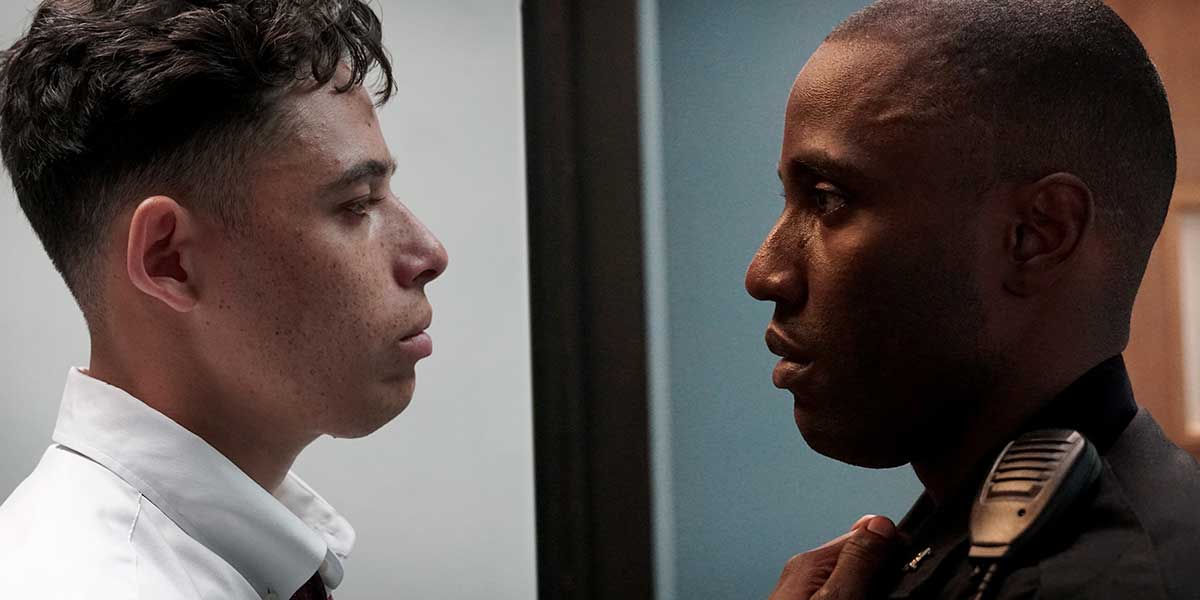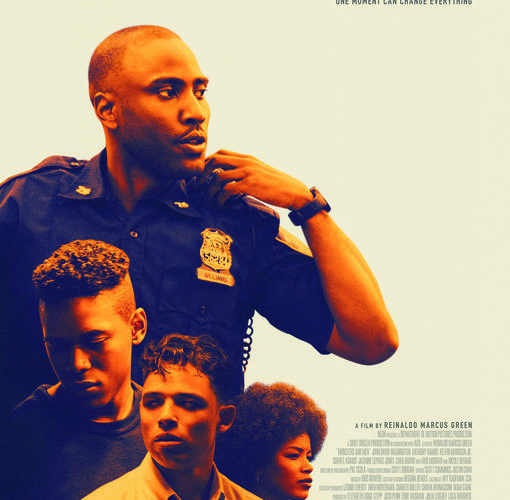The conversation surrounding Black Lives Matter is (and should be) about the victims of police violence who’ve yet to see any killers in blue face real consequences. It’s not about saying their lives matter more than anyone else, but that they matter at all. If you look at the headlines it’s easy to wonder if people think they do — especially the police. Just like nursery rhymes in classrooms have begun teaching youngsters how to stay safe during school shootings, many parents of POC children are forced to provide life lessons white America simply doesn’t think about. So you can go home and say, “He shouldn’t have resisted arrest” all you want. You better know, however, that you’d be alive if you “resisted” the same way he did.
Writer/director Reinaldo Marcus Green looks to expand upon this notion by moving beyond the victim towards those affected by the ramifications of what happened. His debut Monsters and Men uses Darius Larson’s (Samel Edwards) death as a springboard for three minority men in the community of differing ages, social standing, occupations, and responsibilities. It’s a triptych about the tough choices we confront, the ones that pit what’s good for the many against what’s good for us. Sometimes these choices overlap and others find them in direct opposition. Green forces his characters to reconcile what they are because of their skin with what they are despite it. How much guilt can they live with by staying quiet and how much pain are they willing to endure if they don’t?
First up is Manny (Anthony Ramos), a friend of Darius who just happened to be at the corner store where the shooting occurred with phone out filming. He’s also a young father hoping a new job opportunity comes through while his girlfriend (Jasmine Cephas Jones’ Marisol) approaches college graduation, the trio living with his mother to reduce costs. So when Manny starts getting harassed by the police who know he was there and know he has evidence to blow the case wide open, he reaches a crossroads. Marisol wants him to stay quiet because she believes Darius would want him to protect his family. While that’s probably true, however, Manny isn’t certain if being loud is better in order to fix a problem his daughter’s guaranteed to face.

Next is Dennis (John David Washington), an NYPD cop who works in the same precinct as Darius’ killer. He exists between two worlds: a black man who’s been pulled over six times in six months despite the badge and a policeman who understands the split-second decisions his fellow officers must make in the moment. His wife (Nicole Beharie) wants him to think about his son and his partner (Cara Buono) wants him to think about the job. Dennis therefore understands the threat racists wearing a uniform pose for people who look like him as well as the sad fact that speaking out against those bad eggs jeopardizes job security and safety on the street. Is doing what’s right in his heart worth losing everything he’s worked to build?
Last is high school senior Zyric (Kelvin Harrison Jr.), a kid with pro baseball aspirations who can’t help seeing the corruption and hypocrisy running rampant amongst those he’s supposed to trust for protection. You hope someone his age wouldn’t have to deal with this mess considering his pedigree (star athlete, good grades, no alcohol or drugs), but such thoughts are naïve. He’s still a black kid in a hoodie walking home alone from practice at night and thus a prime example of just the sort to be accosted without probable cause. Zyric’s father (Rob Morgan) wants him to hang on for a few more days until a scholarship can provide escape. Unfortunately his mind has shifted towards his friend Zoe’s (Chanté Adams) activism — something more important than sports.
Green therefore hits all the crucial points of conflict by choosing someone on both sides of the gun as well as a member of the next generation who can no longer hope they’ll make the right decision for him. The film doesn’t supply easy answers and also has its characters making some unsurprising choices in ways that let us know how much it will haunt them. Even with this sense of complexity, however, Monsters and Men still can’t stop itself from dipping too far into hyperbolic moments made more powerful by artifice than they ultimately prove. Perhaps this is just because I found Zyric’s conclusion way more optimistic than what I expected after witnessing the tough realities left to Manny and Dennis upon settling on their directions forward.
In the end it’s as though we start three threads without ever finishing any. I think this is the point because the movement continues and won’t be solved overnight, but the whole feels incomplete regardless. I’m glad we return to Manny’s family and that Dennis plays a role in Zyric’s life despite disappearing, but it isn’t quite enough to let the teen’s third act satisfactorily bring closure to all at once. Maybe it would’ve been better if their stories intertwined throughout so they could reach that dramatic destination together. Or maybe Green simply sets up more fireworks than these men eventually face, rendering their finales more whimper than scream. I like this decision on paper because it highlights our complicity and futility, but in reality it left me wanting more.
Monsters and Men screened at the Toronto International Film Festival and opens on September 28.

